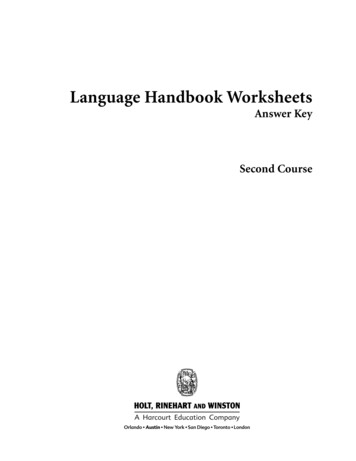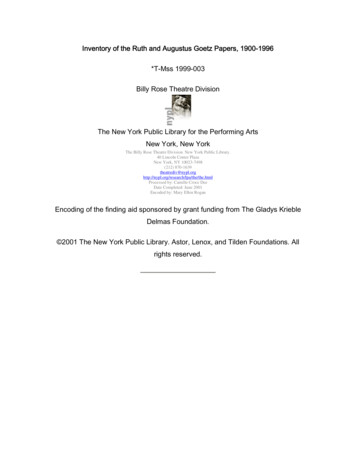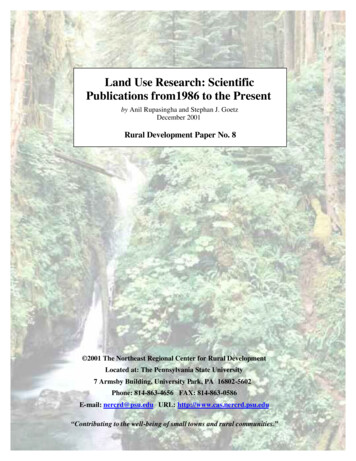
Transcription
Language Handbook WorksheetsAnswer KeySecond Course
Copyright by Holt, Rinehart and WinstonAll rights reserved. No part of this publication may be reproduced ortransmitted in any form or by any means, electronic or mechanical,including photocopy, recording, or any information storage andretrieval system, without permission in writing from the publisher.Requests for permission to make copies of any part of the workshould be mailed to the following address: Permissions Department,Holt, Rinehart and Winston, 10801 N. MoPac Expressway, Building 3,Austin,Texas 78759.HOLT, HRW, and the “Owl Design” are trademarks licensed to Holt,Rinehart and Winston, registered in the United States of Americaand/or other jurisdictions.Printed in the United States of AmericaIf you have received these materials as examination copies free ofcharge, Holt, Rinehart and Winston retains title to the materials andthey may not be resold. Resale of examination copies is strictlyprohibited.Possession of this publication in print format does not entitleusers to convert this publication, or any portion of it, intoelectronic format.1 2 3 4 5 6 7 8 179 09 08 07
Table of ContentsThe Parts of Speech. . . . . . . . . . . . . . . . . . . . 1Agreement. . . . . . . . . . . . . . . . . . . . . . . . . . . 4Using Verbs . . . . . . . . . . . . . . . . . . . . . . . . . . 9Using Pronouns . . . . . . . . . . . . . . . . . . . . . . 13Using Modifiers . . . . . . . . . . . . . . . . . . . . . . 16Phrases . . . . . . . . . . . . . . . . . . . . . . . . . . . . 18Clauses . . . . . . . . . . . . . . . . . . . . . . . . . . . . 21Sentences . . . . . . . . . . . . . . . . . . . . . . . . . . 23Complements . . . . . . . . . . . . . . . . . . . . . . . 26Kinds of Sentences . . . . . . . . . . . . . . . . . . . 28Writing Effective Sentences . . . . . . . . . . . . . 31Capital Letters . . . . . . . . . . . . . . . . . . . . . . . 35Punctuation . . . . . . . . . . . . . . . . . . . . . . . . . 40Punctuation . . . . . . . . . . . . . . . . . . . . . . . . . 45Punctuation . . . . . . . . . . . . . . . . . . . . . . . . . 48Spelling . . . . . . . . . . . . . . . . . . . . . . . . . . . . 51Glossary of Usage . . . . . . . . . . . . . . . . . . . . 54Copyright by Holt, Rinehart and Winston. All rights reserved.Language Handbook 1:Language Handbook 2:Language Handbook 3:Language Handbook 4:Language Handbook 5:Language Handbook 6:Language Handbook 7:Language Handbook 8:Language Handbook 9:Language Handbook 10:Language Handbook 11:Language Handbook 12:Language Handbook 13:Language Handbook 14:Language Handbook 15:Language Handbook 16:Language Handbook 17:Table of Contentsiii
LanguageHandbook1 The Parts of SpeechWorksheet 1Identifying Nouns21. himself22. they23. his24. it25. himselfExercise A1.2.3.4.5.6.7.8.9.10.people; hours; sleepEdisonman; schedule; lifenight; livingdaynotebooks; notes; books; experimentshours; sleeppowers; concentrationproject; days; restdefinition; genius; inspiration; perspirationExercise B1.2.3.4.5.6.7.8.9.10.Chinua Achebe; writer; NigeriaNobel Peace Prize; Mother Teresa; yearTuesday; Margaret; job; Japanteam; (gold) medal; hockey; Olympicsgirl; student; Colombiabaseball; Ellen; mitt; shoesearrings; Debbie; birthdayArmand; chef; brother-in-lawFour; groups; Nigeria; Ibo; Hausa; Fulani;Yorubafamily; Empire State Building; New York CityWorksheet 2Copyright by Holt, Rinehart and Winston. All rights reserved.Identifying and Using PronounsExercise A1.2.3.4.5.My; her; which; she; herselfthisWhich; itself; onethat; everyoneWho; it; herExercise (Pronouns may vary.)11. no one12. his13. Some14. them15. his16. What17. They18. he or she19. They20. usWorksheet 3Identifying Adjectives(If you classify possessivepronouns as adjectives, then answers that areunderscored may be considered correct.)1. young; whimsical2. his; humorous; many; foreign; unknown; his;native3. his; first; popular; successful4. His; quaint; rural; delightful5. Most6. These; supernatural7. many; pleasant8. Moorish9. this; comfortable10. long; literaryExercise A(The first item in a pair is theadjective. The second is the word modified. If youclassify possessive pronouns as adjectives, thenanswers that are underscored may be consideredcorrect.)1. unique—form; Japanese—poetry2. short—poem; strong—emotion; vivid—image;few—words3. English—translations; several—poems;Japanese—poems; our—teacher; our—poet;favorite—poet; brief—report4. Our—reports; accurate—reports; two—hours5. great—place6. eager—I; my—subject; famous—poet7. his—poetry; wonderful—poetry8. excellent—tips; which—books; poetry—books9. My—teacher; her—poet; favorite—poet;Japanese—poet10. My—friend; best—friend; these—poetsExercise BAnswer Key1
LanguageHandbook1 The Parts of SpeechWorksheet 4Identifying and Using Action andHelping ly—wrotestill—useExercise did blockwill defendhas scoredpracticehave suggested(Verbs will vary.)celebrated6. likelasts7. askedleft8. may applyshould reach9. will finishenveloped10. will useExercise B1.2.3.4.5.(Answers will vary.)to what extent—really—had to what extent—partially—basedwhen—Never—had �soon—would createExercise B1.2.3.4.5.6.7.8.9.10.Worksheet 7Identifying Linking andHelping VerbsExercise A1.2.3.4.5.ishas becomearehas beenremains6.7.8.9.10.is consideredisbecamewasIs, is6.7.8.9.10.will appearsmells; isisshould be; can behas becomeExercise B1.2.3.4.5.isis; iswill lookbecomesare madeWorksheet 6Identifying and Using Adverbs(The first item in a pair isthe adverb. The second is the word or wordsmodified.)1. seldom—varies2. never—freezes3. unusually—large4. very—clear5. sometimes—rises6. Yesterday—readExercise A2Language Handbook WorksheetsIdentifying Prepositions andPrepositional PhrasesExercise A1.2.3.4.5.6.7.8.9.10.of fireby lightningfrom this fire; in a shelterwithin a cavebeside the coalsby these coalsof the firein the shelternear the fireduring the Stone Age(The first item is the preposition.second is the object of the preposition.)under—rule; for—yearsas—lawyerthrough—means; for—independenceBecause of—beliefs; with—nonviolencewith—itof—nonviolence; for—truthAccording to—Gandhi; of—strongon—basis; of—peopleof—disappointments; of—life; between—Hindus, Muslims; of—countryfrom—Great BritainExercise BThe1.2.3.4.5.6.7.8.9.10.Copyright by Holt, Rinehart and Winston. All rights reserved.Worksheet 5
LanguageHandbook1 The Parts of SpeechIdentifying Conjunctions andInterjections; Determining Partsof SpeechExercise A1.2.3.4.5.Whew; andbutNeither, nor; andBoth, andor(Answers in parentheses areconsidered optional.)1. early; readily; supernatural2. long; predatory3. female; many; frothy4. This; eventually; (egg); tightly; woody5. tall; very; common; (egg)6. baby; soon; small; rapidly; out7. newborn; often; immediately8. adult; fierce9. several; European; many; North American10. These; Chinese; largestExercise CWorksheet 86.7.8.9.10.Hey, fornot only, but alsoyetbutGosh, and6.7.8.9.10.NPREPCONJADJPRONExercise B1.2.3.4.5.ADVINTADJNVWorksheet 9TestCopyright by Holt, Rinehart and Winston. All rights reserved.Exercise A1.2.3.4.5.6.7.8.9.10.mantis; is; insect; habitscreature; lives; parts; worldspecies; can be found; United Statesmantis; is; friend; farmervictims; include; grasshoppers; caterpillarswait; prey; mantis; rests; legslegs; captures; insectsmantis; does injure; plantspraying mantis; is used; greenhouses; controlpraying mantis; may grow; inches; lengthExercise B1.2.3.4.5.6.7.8.9.10.These; ourI; my; us; that; youShe; her; whoYour; most; himself; he; itany; you; whoHis; he; manyhimself; whose; hewe; we; it; anyone; whoIt; that; some; ussome; her; my; herself; itExercise D1.2.3.4.5.6.7.8.9.10.to the library; about horsesby Toni Morrison; about the legacy; of slaveryacross the countryAlong the way; of Herbert Hoover; in WestBranch, Iowabeneath the sink; behind the cleanserAccording to the newspaper; beside the riverBecause of the heavy rains and flooding;through the cityin front of the housenear the gardenfor his excellent films; among themExercise E1.2.3.4.5.Gosh; andeither, orWell; and; yetbutOops; neither, nor; butExercise Answer Key3
LanguageHandbook2 AgreementWorksheet 1Using Singular and Plural Forms8. uncle—comes9. grandparents—were10. Morning glories—closeExercise n lionsExercise B1.2.3.4.5.bottlessheepgoatsappleteamsWorksheet 2Making Subjects and Verbs AgreeWorksheet 3Using Subjects and Verbs withPrepositional PhrasesExercise A1. descriptions (in the poem) (about Paul Revere)make2. lines (in the poem) are3. tramp (of feet) is4. hoofbeats (of Paul Revere’s horse) shatter5. scenes (on each village street) live6. poems (by Longfellow) have7. One (of my favorite poems) is8. antics (of the old man) make9. Some (of the father’s answers) (to his son) are10. reason (for doing headstands) ticklesExercise esiscompletesseemsExercise AWorksheet 41.2.3.4.5.6.7.8.9.10.Ensuring Agreement withIndefinite You—turnmail �eatsWe—wereThey—callExercise work—consistsit—doesn’tNo weren’tnewspapers—don’tLanguage Handbook Worksheetshasturnbecomeshaswere(The first item in a pair iscorrect. The second is incorrect.)1. have—has6. fear—fears2. are—is7. C3. knows—know8. Do—Does4. are—is9. fill—fills5. wants—want10. have—hasExercise BExercise B6.7.8.9.10.Copyright by Holt, Rinehart and Winston. All rights reserved.1.2.3.4.5.6.7.8.9.10.11.12.13.
LanguageHandbook2 AgreementWorksheet 5Worksheet 7Ensuring Agreement with SubjectsJoined by And, Or, or NorEnsuring Agreement in Questionsand in Sentences That Begin withThere and HereExercise A1.2.3.4.5.6.7.8.9.10.La Tonya, Maria—playPlot, character—areMosses, lichens—growpresident, owner—isApples, oranges, bananas—makeCountry and western—hasLittle Women, Little Men—wereMacaroni and cheese—isMacaroni, cheese—arepork—wasExercise B1.2.3.4.5.6.7.8.9.10.Li, Pang—readsmembers, chairperson—wasjewelry, baskets—areJupiter, Zeus—Isteacher, students—readTina, Fernando—likesChannel 7, Channel 18—showsMs. Galinsky, Mr. Deneuve—hasEaster Island,Aleutian Islands—areskiing, skiing—appealsCopyright by Holt, Rinehart and Winston. All rights reserved.Worksheet 6Ensuring Agreement with CollectiveNouns and with Don’t and Doesn’tExercise doesn’tExercise ��aremembers—DoMiss Bannerman—doesreferences—areMs. �aretruck—isDrama Club—Isn’tStephen—isfamily—isEmily ral—areWorksheet 8Ensuring Agreement with SingularWords That Have Plural ribesmeetsisiscausesisisisAnswer Key5
12.13.14.15.16.17.18.19.20.21.22.23.24.25.2 msiscontainswasmakesWorksheet 9Ensuring Agreement BetweenPronoun and ne, Ignacio—theirdog—his or itsEdgar Allan Poe—hisEveryone—his or herbook—itsIrwin Shapiro—himdad—heMany—theyNo one—his or herYou—yourPaula—herJanet—sheVirginia Driving Hawk eirwriter—herEach—hisShel Silverstein—hisSeveral—theirEach—his or herostrich—itsdogs, cat—theirLanguage Handbook WorksheetsWorksheet 10Avoiding Problems in Agreement ofPronoun and a, Estrella—herMost—theirEverybody—his or herAnyone—his or herSeveral—theirNobody—his or herEach—herSomeone—hisEveryone—his or herMost—theirfew—theirsomebody—his or hereither—himMany—theirany—theirNo one—his or heranybody—his or —herNone—theirNeither—itsWorksheet 11Ensuring Pronoun-AntecedentAgreement with And, Or, and NorExercise tshetheyhistheirhistheysheCopyright by Holt, Rinehart and Winston. All rights reserved.LanguageHandbook
LanguageHandbook2 Agreement(Revisions may vary.)1. Either Jennifer will be bringing her catcher’smitt to the softball game, or Walter will bebringing his.2. Either Joseph will surprise us with his specialrecipe at the dinner party, or the Wongs willsurprise us with theirs.3. Both Christopher and Louise failed to submittheir stories to the student newspaper.4. I suppose that both Clancy and the Donovanswill be unwilling to give us their accounts ofwhat happened.Exercise BWorksheet 12Avoiding Problems in Agreement ofPronoun and AntecedentCopyright by Holt, Rinehart and Winston. All rights 15.16.17.18.19.20.21.22.23.24.25.swarm—its(two) ily—itsCongress—theirflock—its(two) quarts—itsIdylls of the King—itsherd—theirjury—its(sixty-three) cents—itassembly—theirPhysics—it(ten) eir(ten) miles—itclass—itsWorksheet 13TestExercise eren’taren’tExercise B1.2.3.4.5.6.7.8.9.10.There areisdoesn’tarewaswasseemshopehasdon’t(The first item in a set is thecorrect verb. The second item is the subject. Thethird item is the incorrect verb.)1. were—effects—was2. were—swimmers—was3. are—recipes—is4. C—beauty5. has—Each—have6. C—Towns, seaports7. was—tale—were8. C—One9. C—explorations, adventures10. is—Trade—areExercise CExercise D1.2.3.4.5.6.7.8.9.10.None—haveLions Club—meetsLola, Sam—plan(Twenty) pounds—isMathematics—iswriter, director—wasMost—was(Two-and-a-half) months—is“Points of View”—isnews—isAnswer Key7
LanguageHandbook2 AgreementExercise EExercise , Darlene—herband, choir—theysome—their(ten) l—theirEveryone—his or her“Peter and the Wolf”—itCopyright by Holt, Rinehart and Winston. All rights e Handbook Worksheets
LanguageHandbook3 Using VerbsWorksheet 1Worksheet 3Identifying Past, Present, andFuture TensesMore Practice with Irregular VerbsExercise 0.believe; (have) believedshouted; (have) shoutedasking; (have) askedliked; (have) likedclimb; climbingwork; workedsmile; smiledfollowing; (have) followedsupport; supportingcomplete; completedExercise edWorksheet 2Using Irregular VerbsCopyright by Holt, Rinehart and Winston. All rights e .8.9.10.rundrivenriddenknewCExercise B1.2.3.4.5.donehave comeseenwentcomeExercise C1.2.3.4.5.broughtCdrankswumriddenWorksheet 4Identifying and Using Verb TensesExercise A1.2.3.4.5.pastfuture perfectpresent perfectfuturepast perfect6.7.8.9.10.pastpresentpresent perfectfuture perfectpast perfectAnswer Key9
LanguageHandbook3 Using Verbs1. The band plays the same songs at every game.2. We had seen several whales as we cruisedbeyond the waters of the bay.3. Andrea demonstrated the proper way to foldthe flag.4. The butterflies will have migrated to Mexico bythe end of fall.5. Mr. Sharp has shown us how to block a scenein theater class today.6. The rancher will explain to us the differencebetween an emu and an ostrich.7. Ahmed has taken his brother home by now.8. Many divers knew about Jacob’s Well for years.9. We will have begun our tour of BritishColumbia after visiting Seattle.10. The students had handed in their homework.Worksheet 5Using Consistent Verb TenseExercise A(Here is the paragraph inpresent tense.)[1] By the time Saturday comes, I am readyto go. [2] Jeff’s parents drive us there, and we parkas close to the front entrance as we can. [3] Aftermaking arrangements to meet them in two hours atthe bumper cars, we walk down the midway. [4]There are all kinds of rides, and we decide whichones we want to try. [5] We find a ticket booth, andwe each buy twelve tickets. [6] For the first ride, wetake it easy and just go on the Ferris wheel. [7] It’sfun to see all the lights when we are stopped at thetop of the wheel. [8] After that, we go on a coupleof wild rides that are scary but fun. [9] All thatexcitement makes us thirsty, so we find arefreshment stand and order two lemonades.[10] Before we know it, it is ten o’clock and timeto meet Jeff’s parents.(Here is the paragraph in past tense.)[1] By the time Saturday came, I was readyto go. [2] Jeff’s parents drove us there, and weparked as close to the front entrance as we could.[3] After making arrangements to meet them in twohours at the bumper cars, we walked down themidway. [4] There were all kinds of rides, and wedecided which ones we wanted to try. [5] We founda ticket booth, and we each bought twelve tickets.[6] For the first ride, we took it easy and just went10Language Handbook Worksheetson the Ferris wheel. [7] It was fun to see all thelights when we were stopped at the top of thewheel. [8] After that, we went on a couple of wildrides that were scary but fun. [9] All that excitementmade us thirsty, so we found a refreshment standand ordered two lemonades. [10] Before we knewit, it was ten o’clock and time to meet Jeff’s parents.Exercise B(Here is the paragraph inpresent tense.)[1] Eleanor Roosevelt’s parents die whenshe is nine, so she is raised by her grandmotherand sent to school in England. [2] There, she isinfluenced by headmistress Marie Souvestre, whoworks for social causes. [3] As a young adult, Eleanorparticipates in social work before she marriesFranklin Delano Roosevelt. [4] After her husbandenters politics, she works for the American RedCross during World War I and later becomes moreinvolved in politics herself. [5] In the early 1930s,Mrs. Roosevelt becomes a leading activist forwomen’s rights. [6] When her husband is electedPresident of the United States, Mrs. Roosevelt helpsother women get appointed to governmentpositions. [7] She travels around the country, visitscoal mines and slums, and speaks out for the poor.[8] After her husband’s death, Mrs. Roosevelt isappointed by President Truman to be a delegateto the United Nations, where she supports theUN’s Declaration of Human Rights. [9] This servicein the UN is probably her greatest achievement.[10] Eleanor Roosevelt devotes herself to the causesof humanity and is loved by many.(Here is the paragraph in past tense.)[1] Eleanor Roosevelt’s parents died whenshe was nine, so she was raised by her grandmotherand sent to school in England. [2] There, she wasinfluenced by headmistress Marie Souvestre, whoworked for social causes. [3] As a young adult,Eleanor participated in social work before shemarried Franklin Delano Roosevelt. [4] After herhusband entered politics, she worked for theAmerican Red Cross during World War I and laterbecame more involved in politics herself. [5] Inthe early 1930s, Mrs. Roosevelt became a leadingactivist for women’s rights. [6] When her husbandwas elected President of the United States, Mrs.Roosevelt helped other women get appointed togovernment positions. [7] She traveled around thecountry, visited coal mines and slums, and spokeout for the poor. [8] After her husband’s death, Mrs.Roosevelt was appointed by President Truman to beCopyright by Holt, Rinehart and Winston. All rights reserved.Exercise B
LanguageHandbook3 Using Verbsa delegate to the United Nations, where shesupported the UN’s Declaration of Human Rights.[9] This service in the UN was probably her greatestachievement. [10] Eleanor Roosevelt devoted herselfto the causes of humanity and was loved by many.Worksheet 6Identifying and Using Active andPassive VoiceExercise A1.2.3.4.5.AVPVPVAVPV6.7.8.9.10.PVPVAVAVPV(Word order in revisions mayvary slightly.)1. A lasagna dinner was cooked for the family lastnight by Dad.2. Several members of our foreign cultures clubattended the folk-dancing class.3. Some friends were invited by Sarah to go to themovies with her on Saturday.4. Many people see famous works of art in theLouvre Museum in Paris.5. A professional tree trimmer pruned our pecantree.6. A slide show and lecture on native plants of theSouthwest was given by Glen.7. The students read Lincoln’s GettysburgAddress.8. I was invited by the Hardens to their annualLabor Day picnic.9. Dr. Lambert gave our dog his rabiesvaccination.10. A technician fixed our computer.Copyright by Holt, Rinehart and Winston. All rights reserved.Exercise BWorksheet 7Using Sit and SetExercise ingsittingSetsitsWorksheet 8Using Lie and LayExercise glaidlaidlie6.7.8.9.10.lainlaidlaylielayExercise B1.2.3.4.5.lyinglielaylaylaidWorksheet 9Using Rise and RaiseExercise riseraiserisesraise6.7.8.9.10.raised (or raises)rose (or rises)raisedroserisesExercise B1.2.3.4.5.risingroseraisingraiserisenExercise ttingsetsitsetAnswer Key11
3 Using Verbs(Here is the paragraph in past tense.)Worksheet 10TestExercise madeeatenbegunbroughtExercise B1.2.3.4.5.sawchosenledspreadgotExercise C1.2.3.4.5.6.7.8.9.10.had brokenhas sungwill have finishedhas workedempties; feedswill design; will marketpassedwenthas playedflewExercise DExercise E1.2.3.4.5.AVPVPVAVPVExercise etlaidliesrisen(Here is the paragraph inpresent tense.)[1] “Casey at the Bat,” composed byErnest Lawrence Thayer in 1888, becomes the mostfamous baseball poem ever written. [2] The poem isrecited around the country, and audiences love it.[3] However, Thayer considers the poem badlywritten and for years does not admit he is theauthor. [4] Many people try to take credit for thepoem, and several baseball players say the poem isabout them. [5] When the author is finally identified,he refuses to take money for the poem’s manyreprintings.12[1] “Casey at the Bat,” composed by ErnestLawrence Thayer in 1888, became the most famousbaseball poem ever written. [2] The poem wasrecited around the country, and audiences loved it.[3] However, Thayer considered the poem badlywritten and for years did not admit he was theauthor. [4] Many people tried to take credit for thepoem, and several baseball players said the poemwas about them. [5] When the author was finallyidentified, he refused to take money for the poem’smany reprintings.Language Handbook WorksheetsCopyright by Holt, Rinehart and Winston. All rights reserved.LanguageHandbook
LanguageHandbook4 Using PronounsWorksheet 1Worksheet 3Identifying and Using Pronouns inthe Nominative CaseUsing Pronouns as Direct mthemushimherhimhim; hermeherhimusthem; er; methem; mehermeusmethemusWorksheet 4Worksheet 2Identifying and Using Pronouns asPredicate NominativesExercise ACopyright by Holt, Rinehart and Winston. All rights he; wehewe(The first item in a pair iscorrect. The second is incorrect.)1. C6. he—him2. she—her7. C3. we—us8. we—us4. C9. he—him5. I—me10. I—meExercise BUsing Pronouns in theObjective emushim or herususushim or .themmemeherherthemmethemusherusmeAnswer Key13
LanguageHandbook4 Using PronounsExercise BWorksheet 5Using Pronouns as Objects 3.meherhermehimthemushim; herthem; herhim; mehimher; .10.herusherwetheyWorksheet 8TestExercise A1.2.3.4.5.whoheshemeWeExercise BWorksheet 6Using Who and Whom andReflexive Pronouns1.2.3.4.5.OPPRED 0.whomwhowhoWhowhoExercise C6.7.8.9.10.ImyselfyourselvesmehimselfExercise D1.2.3.4.5.ImeheherthemExercise heet 7More Practice with PronounsExercise ge Handbook Worksheets(The first item in a pair iscorrect. The second is incorrect.)1. me—I2. We—Us3. C4. me—I5. him—heExercise selfwhommeherwhoCopyright by Holt, Rinehart and Winston. All rights reserved.Exercise A
LanguageHandbook4 Using Pronouns(The first item in a pair iscorrect. The second is incorrect.)1. me—I2. C3. him—he4. C5. them—they6. us—we7. him—he8. me—I9. C10. CCopyright by Holt, Rinehart and Winston. All rights reserved.Exercise FAnswer Key15
LanguageHandbook5 Using ModifiersWorksheet 1Identifying and Using Modifiers inRegular and Irregular Comparisons7.8.9.10.any other writer—any writeranything else—anythingany other character—any characterany other writer—any writerExercise Afarthermore intriguingmost distantcloserstranger6.7.8.9.10.besthardermost vecomparativepositivesuperlativeExercise vecomparativeWorksheet 2(The first item in a pair iscorrect. The second is incorrect.)1. can be no or can’t be any—can’t be no2. more ready or readier—more readier3. won’t ever guess or will never guess—won’tnever guess4. can hardly wait or can’t wait—can’t hardly wait5. odder—more odder6. couldn’t find . . . anywhere or could find . . .nowhere—couldn’t find . . . nowhere7. quieter or more quiet—more quieter8. could scarcely or couldn’t—couldn’t scarcely9. the funniest or most funny—the most funniest10. Nobody had ever—Nobody had neverExercise BUsing Modifiers CorrectlyWorksheet 4Exercise ACorrecting Misplaced Modifiers1.2.3.4.5.worstbettermost famousmoremore curious6.7.8.9.10.lessmost importantheaviestworsebetter1.2.3.Exercise B1.2.3.4.5.largestdeeperstrongernewermore snugly6.7.8.9.10.most giganticmost interestinggoodbetterhighest4.5.6.7.Worksheet 3Using Other and Else; AvoidingDouble Comparisons and DoubleNegatives(The first item in a pair isstandard. The second is nonstandard.)1. any other story—any story2. anyone else in the studio—anyone in the studio3. any other kind—any kind4. anyone else—anyone5. any other time—any time6. anyone else—anyoneExercise A16Language Handbook Worksheets(Revisions may vary slightly.)Hoping for a chance to play for the all-stars, hewould pitch his final ballgame tonight.That morning he had promised himself hewould not be nervous at the game.Donnie’s sandwich that he had made the nightbefore tasted good.Trying not to think about the game, he lookedup at the birds in the tree.He noticed a male cardinal looking back at him.The brilliant red bird on the limb seemed to tilthis head toward Donnie.Leaning against the trunk, Donnie looked for anest.Finding no signs of other birds, he was puzzledby the presence of the cardinal.Then, from the corner of his eye, he could seethe bird’s beak open.CCAs they approached, they asked him if he wasgoing to pitch a no-hitter.Finishing his sandwich, he joked that he wasgoing to walk all the batters.Without mentioning the bird, Donnie suggestedthey head for the cafeteria.Exercise8.9.10.11.12.13.14.Copyright by Holt, Rinehart and Winston. All rights reserved.1.2.3.4.5.
LanguageHandbook5 Using Modifiers15. Even through his afternoon classes, however,the bird in the tree came to mind.16. That night, growing less worried about theoutcome of the game, Donnie dressed in thelocker room among his teammates.17. C18. C19. There was no way of predicting how a finaldecision on the all-stars would turn out.20. Still, Donnie, wearing a bright red cap, felt luckywalking out on the field.Worksheet 5Correcting Dangling and MisplacedModifiers(Revisions will vary.)1. Wanting to get rich quickly, some men thoughtof a plan to kidnap a boy.2. Kicking and fighting, the boy caused nothingbut trouble.3. Whining hungrily, the child was quickly serveddinner.4. Having finally dozed off, one kidnapper wasawakened at daybreak by screams.5. Terrified and humiliated, the other man hadbeen surprised by the boy’s attack.6. Fearing the parents wouldn’t pay, thekidnappers began to see their plan as less wise.7. Who wouldn’t want a vacation from the boywho pestered and threatened everyone?8. Going on his way to collect the ransom, thekidnapper isn’t sure what he will find.9. You expect O. Henry’
Identifying and Using Action and Helping Verbs Exercise A 1. arrives 6. did block 2. played 7. will defend 3. towers 8. has scored 4. ran 9. practice 5. dodged 10. have suggested Exercise B (Verbs will vary.) 1. celebrated 6. like 2. lasts 7. asked 3. left 8. may apply 4. should reach 9. will finish 5. enveloped 10. will use Identifying Linking and Helping Verbs Exercise A 1. is 6. is .










